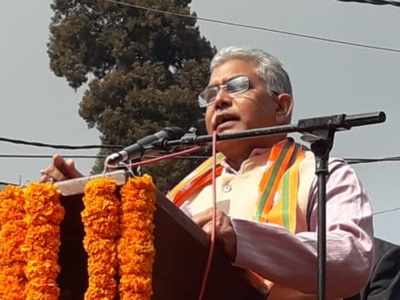- News
- Not necessary that only sitting MLA will become CM when BJP wins in West Bengal: State unit chief Dilip Ghosh
This story is from March 30, 2021
Not necessary that only sitting MLA will become CM when BJP wins in West Bengal: State unit chief Dilip Ghosh

Ghosh, a sitting MP from Medinipur, asserted that the momentum "in favour" of the BJP will continue till the last phase.
"After the first phase of polling only the BJP is confident of its victory, whereas the TMC and its leaders are frustrated. As the election will progress, the trend set by the BJP in the first phase will gain momentum and with every phase of polling TMC workers will themselves realise their defeat," Ghosh told PTI in an interview.
The BJP has fielded four sitting MPs, three from Lok Sabha including Union minister Babul Supriyo, and Swapan Dasgupta, who was in Rajya Sabha, in the Assembly polls, but Ghosh is not among them.
To a query on whether a sitting MLA will become the chief minister if the BJP wins, Ghosh, who himself is seen as a strong contender, said, "It is for the party to decide but it is not necessary a sitting MLA will become the chief minister.... when Mamata ji became chief minister she was not an MLA."
Referring to the party's top leader and Union Home Minister Amit Shah's claim of BJP winning 26 seats out of 30 seats that went to polls in the first phase on March 27, Ghosh said people of the state are now "not afraid" of casting their vote freely. Therefore the "strong undercurrent for BJP has now become an overcurrent" and it will reflect in the result, he said.
He said the BJP has worked on areas such as Kolkata and its adjoining districts where it was relatively less strong and the result of its hard work would be visible now.
Ghosh, who recently stirred a controversy by suggesting that TMC supremo and West Bengal Chief Minister Mamata Banerjee should wear bermuda shorts to display her injured leg rather than wearing a saree, defended his remarks, saying that Banerjee's gesture was not in accordance with the Bengali culture.
"She is a chief minister of West Bengal and people of the state expect from her some decency that goes well with the culture and tradition of Bengal, and with the values of a Bengali woman. I found her gesture objectionable and so do the people of the state," he said.
Talking about the BJP giving tickets to some of its sitting MPs, Ghosh said the party fielding its senior leaders shows its sincerity and commitment towards the people of the state.
To a question on the BJP's 'Jai Shri Ram' slogan, Ghosh said, "It is not merely a chant. It is a slogan of the common man in Bengal who is yearning for change and an expression of anguish against the TMC oppression."
Ghosh started his public life as a 'pracharak' of the BJP's ideological mentor RSS. He joined the BJP in 2014 and became general secretary of its West Bengal unit in 2015 and later president of the state unit.
He made his electoral debut in the 2016 West Bengal Assembly elections by contesting from Kharagpur Sadar constituency in Paschim Medinipur. He won the election by defeating sitting MLA Gyan Singh Sohanpal of Congress, who had won the assembly seat seven times in a row.
Recently Prime Minister Narendra Modi, while addressing a political rally in Kharagpur, heaped praise on Ghosh saying that a state president like him is the pride of the party as he had sacrificed a lot in his personal life to work for the party.
After winning 18 out of the 42 Lok Sabha seats in the state in 2019, the BJP emerged as a strong challenger to the ruling TMC in the current assembly elections.
The elections for the 294-member assembly are being held in eight phases with the first phase on March 27 and the last phase on April 29.
End of Article
FOLLOW US ON SOCIAL MEDIA
